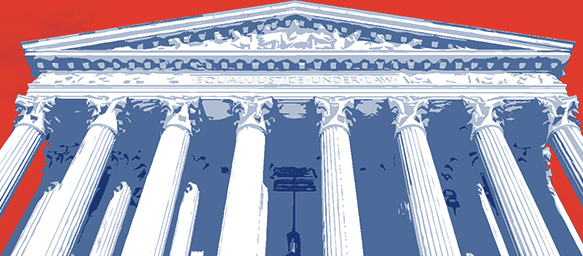Disrupting the Disrupter:
Why This Is a Supreme Court Nomination Like No Other, and What We Should Do About It.
When President Trump nominated Judge Brett Kavanaugh to replace retiring Supreme Court Justice Anthony Kennedy, it was clear to us that while Kennedy’s legacy is complicated, the man Trump named to replace him is not.
Based on his positions on the constitutional and legislative protections that serve all Americans, from women’s freedom to make decisions regarding when—and whether—to start a family; to the constitutionality of the Affordable Care Act; to marriage equality; to equal justice under the law irrespective of race, gender, and other aspects of who we are, Kavanaugh’s nomination would move the Court sharply and immediately away from the values we hold dear and give him the opportunity to shape court decisions that will affect generations.
Equally—if not even more—disturbing is that President Trump is seeking to name a pivotal justice to the very court that will likely rule on any criminal charges brought against him and his administration, and on the Russia investigation, which he has maligned and tried to delegitimize since the start of his presidency.
This is particularly alarming because Kavanaugh is the only one on the list of candidates who has made clear that the president of the United States is above the law. He does not believe that a president should be held accountable through an independent investigation while in office. Thus, Mr. Trump seems to have intentionally selected Brett Kavanaugh for a seat on the Supreme Court not only because of his hard-right, pro-corporate record, but also because he will not provide the very checks and balances that the framers of our Constitution intended in creating a Supreme Court.
Brett Kavanaugh’s ultra-conservative bona fides are certainly not unique, nor is it surprising that he is Trump’s pick. After all, President Trump proclaimed that he would choose a Supreme Court candidate(s) from The Federalist Society and The Heritage Foundation–prepared list, mentioned above.
But the point isn’t just that we must do all that we can to prevent the likes of the hard-right ideologue Brett Kavanaugh—and, frankly, anyone on a list recommended by The Federalist Society and The Heritage Foundation—from ascending to a seat on the high court. It’s that The Federalist Society and The Heritage Foundation created the list the president is considering in the first place, over a bipartisan set of thought partners more representative of America. And it’s especially troubling that these institutions appear to know much more about Brett Kavanaugh and the others they selected than perhaps even the senators who will eventually vote on the nominee.
At this point, we don’t know whether, or how, aspects of Kavanaugh’s record will come forward. We also don’t know, given the events of recent days, whether there are aspects of that record that are being deliberately hidden from the American people.
While it is essential to gain information about the record of any candidate to the Supreme Court, we must also do all that we can to spotlight the fact that any Trump nominee, under these circumstances, would be in the constitutionally unacceptable position of ruling on critical legal questions relating to his investigation or prosecution.
Kavanaugh’s nomination, moreover, comes at a time when Trump has repeatedly demonstrated his fidelity to the president of Russia, while at the same time denigrating the U.S. intelligence community, his own Department of Justice, and America’s closest allies. We cannot be certain that, as Supreme Court justice, Brett Kavanaugh’s loyalties would lie with the American people and the Constitution over the interests of a president who appointed him and an administration that has kowtowed to the likes of Vladimir Putin.
Our constitutional values—the separation of powers and checks and balances—could not be more important to our freedom than they are right now. The stakes for our democracy, in other words, could not be higher.
Therefore, President Trump’s ability to choose a nominee to our nation’s highest court—especially a hard-right nominee who may not hold the president accountable—is a call to action that must be answered with an even greater, more focused level of strategy, creativity, and collaboration than ever before.
We know it’s an uphill battle, but it’s one that we can win.
History reminds us that defeating Supreme Court nominations is difficult. It also reminds us of the importance of endurance. The last successful challenge to a Supreme Court nomination was the defeat of Judges Robert Bork and Douglas Ginsburg in 1987. Before that, it was Clement Haynsworth and G. Harrold Carswell in 1969 and 1970, respectively, both of whom were defeated based in part on their ties to white supremacy. In those fights, social justice leaders came together to make clear to the Senate and the American people that the nominees—and the president’s intent in nominating them—were out of sync with our national and constitutional values. The justices ultimately seated in those instances were Justice Harry A. Blackmun in 1970 and Justice Kennedy in 1987.
While today’s landscape is even more challenging with a polarized Senate, an emboldened and extremely vocal opposition, a chaotic political and media environment, and the absence of the filibuster as a tool for moderation and consensus building, we must be in it to win, and not just for the short-term, but for the long game. Let’s not forget how Kavanaugh’s supporters unjustifiably and unapologetically blocked President Obama’s nomination of moderate Judge Merrick Garland and seated Justice Neil Gorsuch. Our actions must emulate the same stick-to-itiveness that those supporters continue demonstrating today. They are running the marathon, not the sprint, and they are now even more aligned to move the Court sharply away from constitutional rights, values, and accountability.
Thus, these extraordinary times call for each of us to dig deep and offer new and innovative approaches in our work to define Brett Kavanaugh as unfit for the Supreme Court. They call for strategies that will disrupt the usual process through any lawful means necessary, using all resources and allies at our disposal. So, while Kavanaugh’s record on the issues that are at the heart of our American ideals is—and should be—dissected, we must also keep the end goal in mind and operate accordingly. This means making this fight about the foundation of our democracy—not only about one seat on the high court.
To win, we must implement the following strategies at the same time:
- Join our SaveSCOTUS.org allies and others in continuing to prioritize a strategic mix of (a) persuading undecided audiences in pivotal states including WV, AK, ME, ND, and IN; (b) activating base audiences in the pivotal states and other parts of the country; and (c) delegitimizing and disrupting the opposition wherever possible. The current swing-state focus on protecting the Affordable Care Act and Roe v. Wade, although necessary, should be only one tool to move persuadables and motivate segments of the base.
- Establish as a primary goal that we must convince a critical mass of political, cultural, and opinion leaders that President Trump’s actions and the open investigations into his administration should disqualify him from naming a Supreme Court justice. We must do all that we can to normalize the understanding that President Trump is a suspect in multiple cases of historic and constitutional magnitude and, therefore, cannot constitutionally or ethically be permitted to choose the justice who will likely decide his case.
- Make popular culture a major force in the effort on par with other, more traditional tactics. This requires letting creatives create in their own ways, while tying their work to a common goal and overarching narrative. The 2008 Obama campaign’s flexible partnerships with artists, musicians, and cultural influencers is a recent model worth emulating and upscaling.
- Step up the use of traditional and digital media to broaden the scope of bipartisan opposition to Kavanaugh. This is where traditional approaches such as op-eds, editorial board meetings, white papers, and the like will be most helpful, creating a drumbeat of voices calling for a halt to the process on constitutional grounds while making the substantive case against the nominee and his extremist supporters.
- Call out the dangerous constitutional crisis into which the president has plunged our nation and make clear the solutions needed to right the ship. That, in turn, necessitates choosing messaging and content of visceral dramatic value, one example being recent audio of immigrant children in detention pleading for their parents. That intensely emotional content was the tipping point that coalesced with litigation, advocacy, and other strategies to change the narrative and some aspects of policy. It is a dynamic that we must learn from and consider utilizing.
- Significantly step up criticism of the colossally inappropriate role—and extremist and un-American values—of The Federalist Society and The Heritage Foundation in selecting the judges who should rule fairly for the whole nation. As already noted by some advocates, the failed federal circuit court nomination of The Federalist Society member Ryan Bounds based on his racist writings should be revealed as the tip of the iceberg when it comes to those organizations’ ties to extremists.
- In the context of constitutional values, remind relevant audiences at every turn of this president’s support for white supremacy and bigotry, from his criticism of Judge Curiel based on his heritage, to his slander of Mexican-Americans, to his praise of neo-Nazis in Charlottesville, to his ties with the racist “Alt-Right” movement. Also, kowtowing to Russia and embracing bigotry are vulnerabilities that arise again and again, and ones about which President Trump cannot disguise his predilections.
In the face of atrocious policies that pose serious threat to our Constitution and our country’s ideals of opportunity and inclusion, we must treat this fight differently. Alongside many others, The Opportunity Agenda sees the dire need to dig deep and stop Kavanaugh’s nomination. We must protect the hard-fought, historic gains our country has made in promoting and preserving opportunity.
Therefore, we are calling for preventing not only Brett Kavanaugh from taking a seat on the Supreme Court, but also President Trump from circumventing the constitutional accountability that its founders fully intended. Preserving our democracy depends on nothing short of that.




